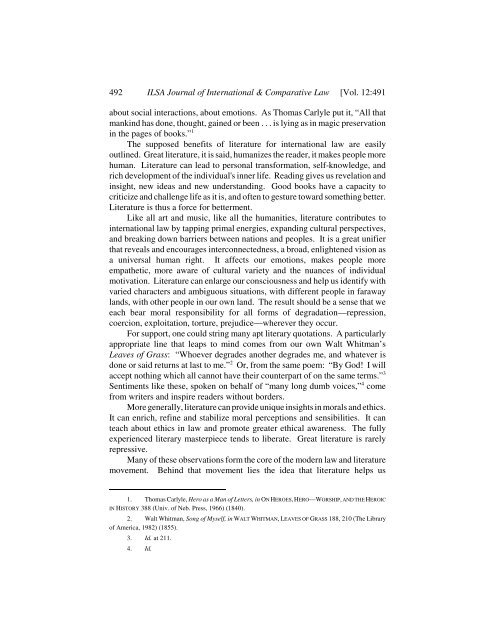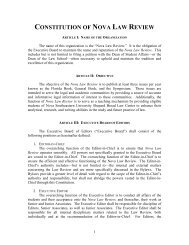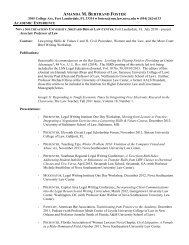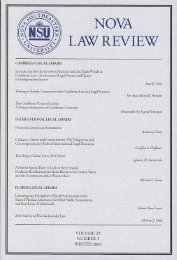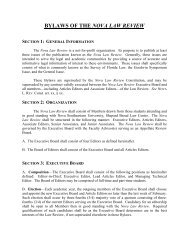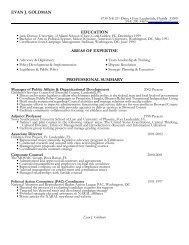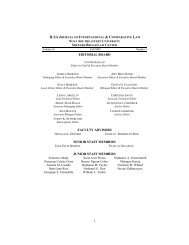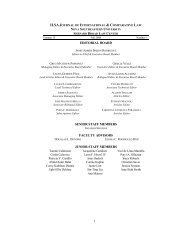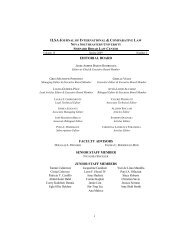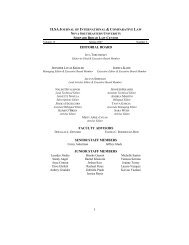Volume 12:2 - Shepard Broad Law Center - Nova Southeastern ...
Volume 12:2 - Shepard Broad Law Center - Nova Southeastern ...
Volume 12:2 - Shepard Broad Law Center - Nova Southeastern ...
You also want an ePaper? Increase the reach of your titles
YUMPU automatically turns print PDFs into web optimized ePapers that Google loves.
492 ILSA Journal of International & Comparative <strong>Law</strong> [Vol. <strong>12</strong>:491about social interactions, about emotions. As Thomas Carlyle put it, “All thatmankind has done, thought, gained or been . . . is lying as in magic preservationin the pages of books.” 1The supposed benefits of literature for international law are easilyoutlined. Great literature, it is said, humanizes the reader, it makes people morehuman. Literature can lead to personal transformation, self-knowledge, andrich development of the individual's inner life. Reading gives us revelation andinsight, new ideas and new understanding. Good books have a capacity tocriticize and challenge life as it is, and often to gesture toward something better.Literature is thus a force for betterment.Like all art and music, like all the humanities, literature contributes tointernational law by tapping primal energies, expanding cultural perspectives,and breaking down barriers between nations and peoples. It is a great unifierthat reveals and encourages interconnectedness, a broad, enlightened vision asa universal human right. It affects our emotions, makes people moreempathetic, more aware of cultural variety and the nuances of individualmotivation. Literature can enlarge our consciousness and help us identify withvaried characters and ambiguous situations, with different people in farawaylands, with other people in our own land. The result should be a sense that weeach bear moral responsibility for all forms of degradation—repression,coercion, exploitation, torture, prejudice—wherever they occur.For support, one could string many apt literary quotations. A particularlyappropriate line that leaps to mind comes from our own Walt Whitman’sLeaves of Grass: “Whoever degrades another degrades me, and whatever isdone or said returns at last to me.” 2 Or, from the same poem: “By God! I willaccept nothing which all cannot have their counterpart of on the same terms.” 3Sentiments like these, spoken on behalf of “many long dumb voices,” 4 comefrom writers and inspire readers without borders.More generally, literature can provide unique insights in morals and ethics.It can enrich, refine and stabilize moral perceptions and sensibilities. It canteach about ethics in law and promote greater ethical awareness. The fullyexperienced literary masterpiece tends to liberate. Great literature is rarelyrepressive.Many of these observations form the core of the modern law and literaturemovement. Behind that movement lies the idea that literature helps us1. Thomas Carlyle, Hero as a Man of Letters, in ON HEROES, HERO—WORSHIP, AND THE HEROICIN HISTORY 388 (Univ. of Neb. Press, 1966) (1840).2. Walt Whitman, Song of Myself, in WALT WHITMAN, LEAVES OF GRASS 188, 210 (The Libraryof America, 1982) (1855).3. Id. at 211.4. Id.


